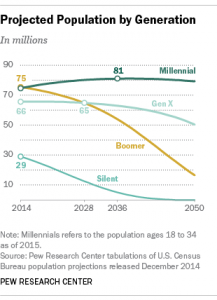
For the first time in our history, companies are struggling to deal with four generations at work at one time. The resulting culture clash is causing some serious issues that you, as young professionals, need to be aware of.
The picture above demonstrates one experience I’m sure you’ve had–teaching your parents (Boomers or Xers) to text. While texting is second nature to you, it’s not for other generations. Learn about the different generations so you can be more successful dealing with differences.
A generation occurs roughly every 20 years. Social scientists clump a generation together according to events and external influences that the group shared. This is not a fixed science, so you will see different range of years for different generations. The characteristics of the generations don’t change, though.
The Traditionalists, born between 1900 and 1945, are mostly retired but some are still working, carrying on the beliefs, practices, and loyalty of the Greatest Generation, as they have been called. They experienced world wars, the Depression, and the industrialization of our country. While they technically are two generations, this group is viewed as one generation because their values and life experiences were the same. The key invention in their generation: radio.
Many Baby Boomers, born between 1945 and 1962, are in management and leadership positions today. This generation identifies with JFK, Martin Luther King Jr., the Beatles, and the Beave. They fought for civil rights and women’s rights and in Vietnam and against the draft. They rolled in the mud at Woodstock and launched Saturday Night Live. The greatest invention of their generation: television.
Generation X, born between 1963 and 1982, is comprised of so many different groups that researchers couldn’t find one label that fits all of them, thus the term Generation X. Gen Xers identify with Bill Clinton, Bill Gates, Michael Jordan, and Dilbert. They experienced the highest divorce rate in U.S. history and were the first latch-key kids. They saw their parents’ loyalty to corporate America rewarded by widespread layoffs. The greatest invention for them: the personal computer.
And there are the Millennials, born between 1981 and 1999. Influencers for them include Prince William, Tinky Winky, Kurt Cobain, and Britney Spears. These people have lived with Colombine, the 9-11 bombing of the Twin Towers, and the bombing at the Olympics. The Millennials have grown up with cell phones and instant messaging. Whereas other generations have had to work on diversity, the Millennials have grown up expecting diversity. Some researchers believe this group will be known as the Next Greatest Generation. The greatest invention for this group: the Internet.
The challenge of managing four generations is marked by having to manage four different sets of values.

2015 is the year that Millennials are expected to outnumber the other generations in the workplace. As a Millennial, you have the opportunity to learn from the three generations ahead of you.
Seek out the senior gurus in your office, the people who have been around and know the business in great detail. Ask them if they would be willing to go to lunch with you and share some of their experiences and knowledge. Take notes (on paper, not your phone or tablet) during lunch as a sign of respect. Thank them. Pick up the tab.
Here are some questions you could ask this senior person.
(Notice a trend with the “why” questions? Add “why” questions to your career toolbox.)
Many of the conflicts that seem to arise from generational differences often come from a lack of communication. Research shows the major problem is not that conflict exists, but that it comes from conjecture, not from facts. The key, then, is to manage the perceived gap by communicating openly and honestly. If you’re on a project team or in a department that seems to be suffering from generational conflict, follow these steps.
A couple of Boomers recently were bemoaning the habits of the Millennials. As one Boomer said to the other: “Boomers just need to get over it. We’ve had our chance. It’s their turn now.”
Take advantage of that, Millennials. Be the best professional you can be.
© Pamela A. Scott, 2015
MentorLoft
This Year, Millennials Will Overtake Boomers at Work